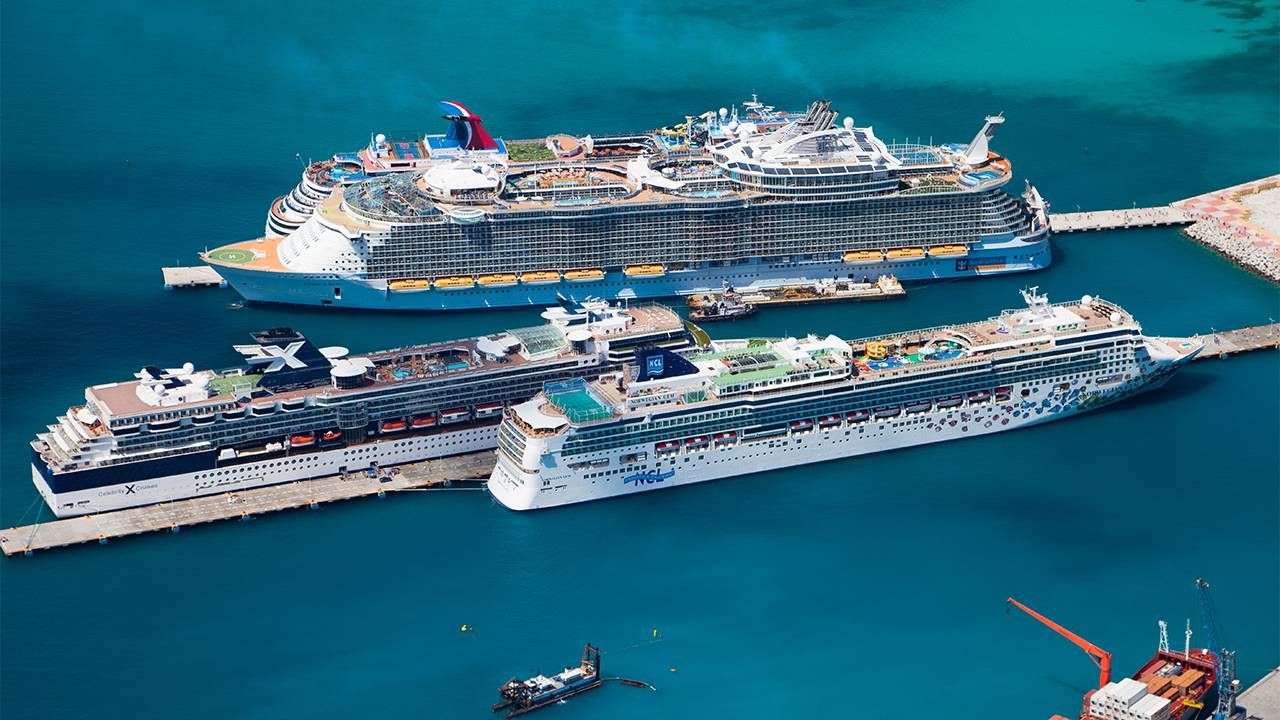Hoping to Take a Cruise? Here's What to Know
Your guide to the new rules for boarding, booking, buffets and having the best time
Editor’s note: This article was updated June 21, 2021, to reflect news and changes about cruising since the piece was first published earlier in June.
You may have been able to hear the champagne corks pop and cheers resound on June 5 as the Celebrity Millennium cruise ship weighed anchor for a Caribbean cruise departing from St. Maarten, with North American passengers. It was the first major ship open to them since the pandemic shut things down in March 2020. The first to sail from a U.S. port will be the Celebrity Edge, leaving Ft. Lauderdale, Fla. on June 26, 2021.

The Centers for Disease Control and Prevention (CDC) has given permission for cruises to sail in U.S. waters if they complete "trial" cruises or comply with the agency's vaccination requirements.
That means, depending on the cruise line and where you are on the ship, you may be required to wear a mask, will be reminded to wash your hands frequently and maintain distancing. Each cruise line's site has a link to its CDC precautions and practices.
New COVID-19 Cruise Ship Safety Protocols
Cruise lines are coming up with their own safety protocols. For instance, Royal Caribbean's policy is that if "a certain level of COVID-19 is detected onboard the ship during your voyage, the voyage will end immediately, the ship will return to the port of embarkation, and your subsequent travel, including your return home, may be restricted or delayed."
"I'm looking forward to being spoiled for a week!"
Some people who enjoy cruising remain leery due to more than 700 Diamond Princess passengers and crew members contracting COVID-19 in March 2020, confined to the ship for more than a month.
Many others, however, are itching to get back onboard.
Diane Wahl Garmany, of Dallas, can't wait for her upcoming Viking Ocean Cruise around Bermuda. "I'm looking forward to being spoiled for a week!," she says. "It will be interesting to see how they deal with COVID precautions."
She says the cruise line notified her: "In consideration of your health and safety, only Viking-offered shore excursions will be allowed during your voyage."
The anticipation by cruise travelers is heightened because they've often had one or more trips called off in the past 18 months due to COVID-19 restrictions.
For instance, Stephen Runyard, of Englewood, Colo., who's taken about 100 cruises, has had four canceled by the French luxury cruise operator Ponant. He's hoping to actually sail in December.
Cruise Tips From the Experts
If you're ready and figuratively (if not literally) packed, here are a few things to know:
Prices will be rising. That's because there's a pent-up demand and the cruise lines will try to capture some of last year's losses. Bookings for 2022 are exceeding those of 2019, with some ships selling out in a single day.
Tanner Callais of the Cruzely cruise booking agency says, "Looking specifically at the summer prices, there aren't many deals out there. Carnival's first sailing from Galveston, Texas in July will cost roughly one thousand dollars per person for the least expensive interior cabin. "
And, Callais added, "I even noted that cruises from the U.S. are priced higher than similar trips sailing from Caribbean ports."
The good news, he noted, "is that if you are flexible and can wait until the fall or winter, then rates drop seasonally. That's certainly the case right now."
COVID-19 safety rules will depend on the type of cruise you want to take. While the big-ship cruise lines (carrying 250 or more passengers and crew) have been trying to determine how to deal with coronavirus passenger safety and regulations of individual countries, ships of the American Cruise Lines, USA River Cruises and American Queen Steamboat Company have been cruising America waterways for months.
They ply the Chesapeake Bay, Hudson River, Mississippi River, Great Lakes, Intracoastal Waterway along the East Coast, Columbia and Snake rivers and Alaska. Their small size (100 to 200 passengers) and required-vaccination policies provide a peace of mind to people leery of large ships.
And because they have domestic ports, passengers can drive or take Amtrak between the cruise and home and not worry about dealing with airports or planes.
By state regulation, all passengers on Alaska cruises must have had their final dose of an approved COVID-19 vaccine at least 14 days prior to the beginning of the trip. That means guests who aren't vaccinated, including children who aren't eligible for a vaccine, won't be permitted to sail.
You'll be seeing changes onboard. That might mean: assigned times for check-in and departure; safety exercises with in-cabin or online check-in; contact tracing practices; fewer passengers than normal; reservations for dinners and shows (which could mean no last-minute walk-ins); deck chairs by the pool in pods of three or four with separation between pods; hand sanitizers almost everywhere and physical distancing in common areas.
Those beloved buffets will now have crew members serving you portions instead of you serving yourself.
Those beloved buffets will now have crew members serving you portions instead of you serving yourself, though you can still have as much as you want. The rationale: the cruises will avoid contact points of dozens or hundreds of people handling the same serving utensils.
You can also look for an easing of cancellation fees or changed-reservation fees. And the number of shore excursions, as well as the number of guests allowed on each one, may be limited.
Some ships, says Kyle Bruening, of the Cruise Finder site "will have modified or enhanced medical facilities to provide onboard critical care capacity for COVID-19 cases and to separate potentially infected persons from those with noninfectious diseases. They might have supplemental medical equipment including diagnostic equipment, face masks, and other PPEs [personal protective equipment]."
According to current CDC regulations, "cruise ship operators must also build the onboard laboratory capacity needed to test crew and future passengers."
John Goodman, speaking for the air quality enhancement firm AtmosAir, says the Norwegian, Oceania, Regent Seven Seas, Princess, and Virgin Voyages are using his company's BPI coronavirus-deterring technology for their HVAC systems "to provide enhanced safety and wellness and help regain passenger confidence."

Norwegian Cruise Line has installed AtmosAir's BPI system on all 28 of its Norwegian Cruise Line, Oceania Cruises and Regent Seven Seas Cruises ships. Carnival has it in specific sections on some of its ships.
Vaccination rules will vary. Although most cruise lines are requiring proof of COVID-19 vaccination, if you haven't been vaccinated and want to cruise, you may still be able to do so.
Royal Caribbean, for example, has modified its vaccination policy. While all its crew members will be vaccinated, guests departing from Florida and Texas ports won't need to be.
However, the company says, "all unvaccinated guests age 12 and older will need to arrange and take an RT-PCR [COVID-19] test at their expense no more than 5 days before arriving in the Bahamas (Bahamian government requirement). On boarding day, all unvaccinated youth guests age 2 and older will take a complimentary SARS CoV-2 test at the cruise check-in hotel in Nassau."
Regulations and recommendations seem to change on a daily basis. The CDC has modified its recommendations from Level 4 ("very high") to Level 3 ("high"). That means it no longer considers cruising unsafe for anyone, but is recommending that those who are not fully vaccinated avoid cruising.
Since 90% of Royal Caribbean's first passengers are said to be vaccinated or plan to be before they sail, the cruise line is separating the vaccinated from the non-vaccinated with separate sections in the dining room and shows that are for the vaccinated only. Unvaccinated guests or those unwilling to show proof of vaccination will be required to wear a face mask at all times, except when eating, drinking or in their cabin. They may also be restricted from going ashore or only going ashore while on an excursion booked through the cruise line, depending on the port of call. Passengers may be required to reserve a time slot at the gym and even the buffet.
Carnival and Norwegian have indicated they will require 100% vaccination, even for ships cruising out of Texas and Florida.
Royal Caribbean's first cruises on the Odyssey of the Seas have been canceled because eight crew members tested positive for COVID-19. It's said they were tested during the 14-day period after the final shot, so this is a matter of extreme caution. Once cruises resume, anyone testing positive will be placed in isolation so they cannot spread the virus.
Travel insurance is highly advised. Amanda Hand of G1G Travel Insurance says, "The absolute best option is 'cancel for any reason' (CFAR) travel insurance, where travelers can cancel for any reason and get seventy-five percent or more back." Regular travel insurance costs about 40% what CFAR does.
The price of a travel insurance policy for a cruise vacation will vary by the length of the trip, the destination, your age and the cost of the trip. It's less expensive if you're paying with travel points instead of cash or credit card.
A 55-year-old traveler on a $1,000 cruise for seven days might pay just over $100 for CFAR insurance. If the trip cost $5,000, the premium would be closer to $500.
You can't cancel your trip at the last minute and qualify for CFAR claims. You must cancel 48 hours or more before departure.
Hand suggests that "healthy travelers look at their credit card for travel insurance benefits." However, she notes, "pre-existing medical conditions aren't covered."
Cruisegoers who are 65 and older need to remember that Medicare typically doesn't cover medical expenses while abroad.
A few more tips on insurance from Rajeev Shrivastava, CEO of Visitors Coverage travel insurance marketplace, says, "Insurance offered directly through a cruise line generally doesn't provide adequate coverage and tends to be heavily weighted in favor of the cruise line. These plans may not cover travel costs en route to the cruise, onshore medical costs, evacuation costs or pharmacy drug costs."
He recommends insurance that covers baggage loss or delay.

